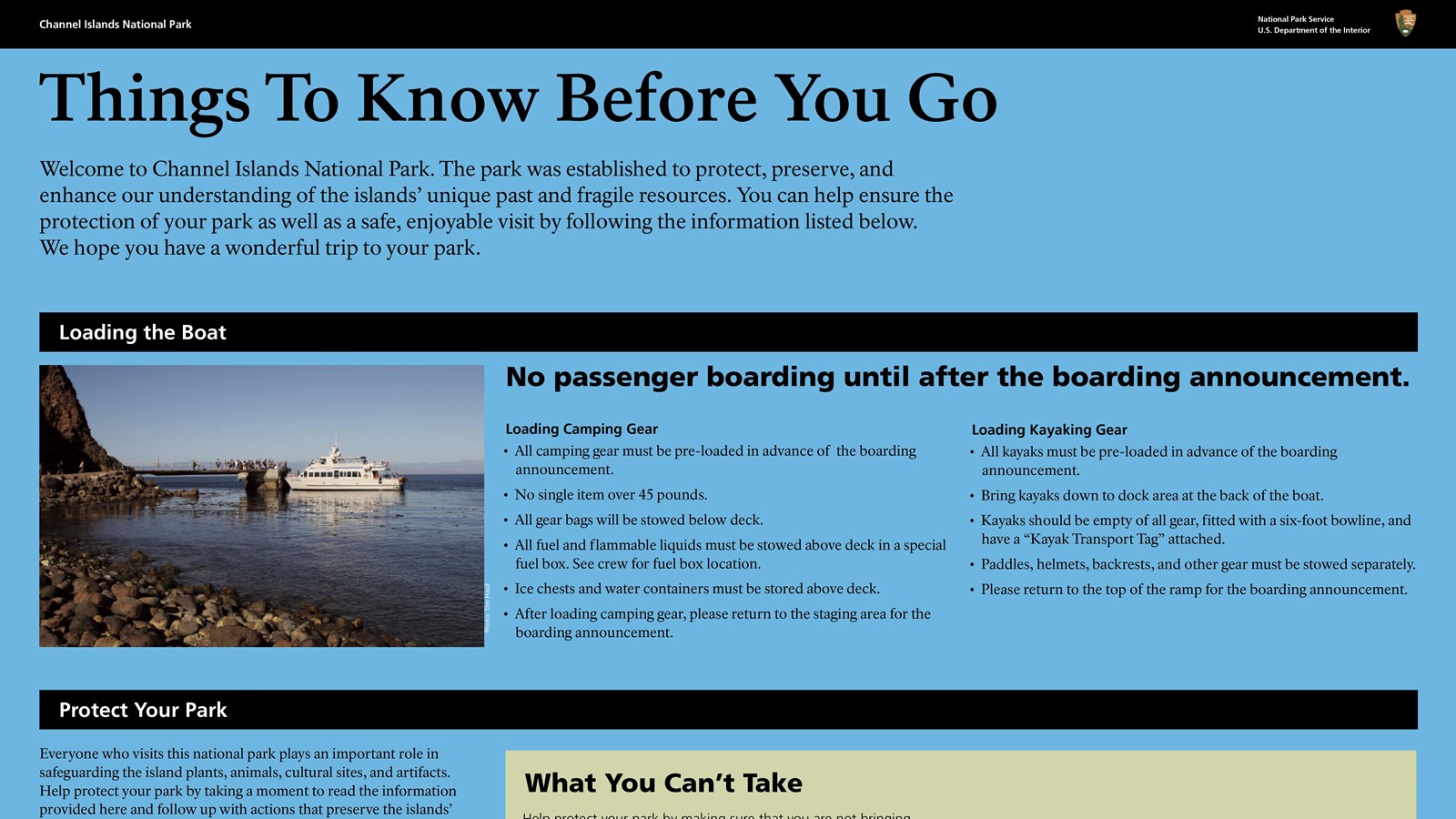Last updated: May 7, 2021
Place
Sign: Things To Know Before You Go

Information
Welcome to Channel Islands National Park. The park was established to protect, preserve, and enhance our understanding of the islands' unique past and fragile resources. You can help ensure the protection of your park as well as a safe, enjoyable visit by following the information listed below. We hope you have a wonderful trip to your park.
Loading the Boat
No passenger boarding until after the boarding announcement.
Loading Camping Gear
- All camping gear must be pre-loaded in advance of the boarding announcement.
- No single item over 45 pounds.
- All gear bags will be stowed below deck.
- All fuel and flammable liquids must be stowed above deck in a special fuel box. See crew for fuel box location.
- Ice chests and water containers must be stored above deck.
- After loading camping gear, please return to the staging area for the boarding announcement.
Loading Kayaking Gear
- All kayaks must be pre-loaded in advance of the boarding announcement.
- Bring kayaks down to dock area at the back of the boat.
- Kayaks should be empty of all gear, fitted with a six-foot bowline, and have a "Kayak Transport Tag" attached.
- Paddles, helmets, backrests, and other gear must be stowed separately.
- Please return to the top of the ramp for the boarding announcement.
Protect Your Park
Everyone who visits this national park plays an important role in safeguarding the island plants, animals, cultural sites, and artifacts. Help protect your park by taking a moment to read the information provided here and follow up with actions that preserve the islands' fragile resources. For additional information and regulations, please refer to the park newspaper or www.nps.gov/chis.
Everything is protected.
As in all national parks, do not feed, collect, disturb, or harm park wildlife, plant life, or other natural and cultural features. Please collect no souvenirs other than memories and photographs.
Hike only on designated trails.
Hikers must stay on established trails on Anacapa, Santa Barbara, and Santa Miguel Islands. Although hiking off trail is permitted on the other islands, it is recommended that visitors use the designated island trail system. Anyone leaving the designated trail system should have experience in off-trail hiking and navigation. Visitors should stay back from cliffs and should not rock climb as the cliffs and rock faces are very unstable.
Remove your garbage.
Pack out what you pack in, including your garbage. Also, secure your food and trash from birds and animals at all times.
No pets.
Domestic house pets can carry diseases that could harm the rare island fox or other animals that are unique to the islands. Service animals require a permit from the park superintendent.
No campfires or charcoal fires.
Due to extreme fire danger, no campfires or charcoal fires are permitted on the islands. Use only enclosed gas campstoves for cooking.
Smoking allowed only on beaches.
Please take cigarette butts off the islands with your other trash.
No fishing within Marine Reserves.
Marine Protected Areas, including Marine Reserves and Marine Conservation Areas, are found throughout the park, marine sanctuary, and state waters. Within these areas it is unlawful to injure, damage, take, or possess any living, geological, or cultural marine resource. Limited harvest is allowed in Marine Conservation areas. Please see park, sanctuary, and state publications for specific regulations.
Be aware of boat departure times
When departing the islands, visitors are responsible for meeting the boat concessioner on time. Ask the ranger or concessioner for departure times.
What You Can't Take
Help protect your park by making sure that you are not bringing any of the items below to the islands. This effort will help prevent the introduction of non-native species, protect native species and ecosystems, and reduce safety risks.
- Soil or seeds: Clean and inspect clothing and gear. Use provided boot brushes.
- Live or potted plants
- Cut flowers
- Firewood or any untreated, unfinished wood (including hiking sticks)
- Corrugated boxes
- Pets
- Tools or equipment with attached soil
- Motorized vehicles
- Bicycles
